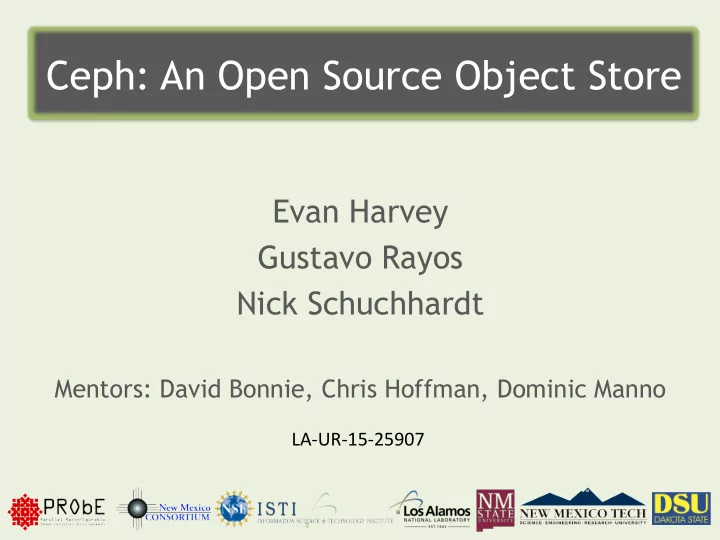

Ceph: An Open Source Object Store Evan Harvey Gustavo Rayos Nick Schuchhardt Mentors: David Bonnie, Chris Hoffman, Dominic Manno LA-‑UR-‑15-‑25907 ¡ 1 ¡
What is an Object Store? • Manages data as objects • Offers capabilities that are not supported by other storage systems • Object Storage vs. Traditional Storage 2 ¡ LA-‑UR-‑15-‑25907 ¡
What is Ceph? • An object store and filesystem • Open source and freely available • Scalable to the Exabyte level 3 ¡ LA-‑UR-‑15-‑25907 ¡
Basic Ceph Cluster • Monitor Node – Monitors the health of the Ceph cluster • OSD Node – Runs multiple Object Storage Daemons (One daemon per hard drive) • Proxy Node – Provides an object storage interface – Can interact with cluster using PUT/GET operations – Provides applications with a RESTful gateway to the Ceph storage cluster 4 ¡ LA-‑UR-‑15-‑25907 ¡
Basic Ceph Cluster 5 ¡ LA-‑UR-‑15-‑25907 ¡
But Why? • Campaign Storage • More reliable than other file systems • POSIX compliant • Scales better than RAID • Cost efficient ¡ 6 ¡ LA-‑UR-‑15-‑25907 ¡
Project Goals • Build a Ceph storage cluster – 1 Monitor node – 6 OSD nodes (Around 20 OSD daemons each) – 3 proxy nodes • Erasure coding profiles • Single vs. Multiple proxies 7 ¡ LA-‑UR-‑15-‑25907 ¡
Test Environment • CentOS 6.6 • Ten HP ProLiant D380P Gen8 Servers • Three Supermicro 847jbod-14 (45 disks each) • Mellanox Infiniband 56 Gb/s • Two SAS cards 6 Gb/s – 8 ports at 600 MB/s • Four Raid cards 6 Gb/s – 8 PCI Express 3.0 lanes 8 ¡ LA-‑UR-‑15-‑25907 ¡
Our Set Up 9 ¡ LA-‑UR-‑15-‑25907 ¡
Pools and PGs 10 ¡ LA-‑UR-‑15-‑25907 ¡
Pools and Placement Groups • An object belongs to a single placement group • Pools group placement groups • Placement groups belong to multiple OSDs 11 ¡ LA-‑UR-‑15-‑25907 ¡
CRUSH! • Controlled Replication Under Scalable Hashing (CRUSH) • Algorithm finds optimal location to store objects • Stripes objects across storage devices • On the OSDs 12 ¡ 12 ¡ LA-‑UR-‑15-‑25907 ¡
13 ¡ LA-‑UR-‑15-‑25907 ¡
14 ¡ LA-‑UR-‑15-‑25907 ¡
15 ¡ LA-‑UR-‑15-‑25907 ¡
16 ¡ LA-‑UR-‑15-‑25907 ¡
17 ¡ LA-‑UR-‑15-‑25907 ¡
Erasure Coding • High resiliency to data loss • Smaller storage footprint than RAID • Data is broken up into object chunks • Striped across many hard drives • K + M values used to stripe • Various erasure profiles 18 ¡ LA-‑UR-‑15-‑25907 ¡
Erasure Coding 19 ¡ LA-‑UR-‑15-‑25907 ¡
Results • Difficult to install and configure Ceph on CentOS 6.6 • Multiple proxies write faster than a single proxy • Replicated profile was faster than the erasure coded profiles • K + M values did not significantly affect read and write speeds 20 ¡ LA-‑UR-‑15-‑25907 ¡
21 ¡ LA-‑UR-‑15-‑25907 ¡
22 ¡ LA-‑UR-‑15-‑25907 ¡
23 ¡ LA-‑UR-‑15-‑25907 ¡
Ceph Headaches • Documentation is inaccurate • Nodes must be configured in specific order – Monitor à OSDs à Proxies • Ceph was unable to recover after hardware failure • Could only use one out of the four Infiniband lanes • Unable to read in parallel 24 ¡ LA-‑UR-‑15-‑25907 ¡
Conclusion • Ceph is difficult to install and configure • Stability of Ceph needs to be improved • Unable to recover from hardware failures during benchmarking • Performance was promising 25 ¡ LA-‑UR-‑15-‑25907 ¡
Future Work • Investigate bottleneck of tests • Further explore pool configurations and PG numbers • Look into Ceph monitoring solutions • Test differences between ZFS/BTRFS vs XFS/EXT4 26 ¡ LA-‑UR-‑15-‑25907 ¡
LA-‑UR-‑15-‑25907 ¡ Acknowledgements • Mentors: David Bonnie, Chris Hoffman, Dominic Manno • Instructors: Matthew Broomfield, assisted by Jarrett Crews • Administrative Staff: Carolyn Connor, Gary Grider, Josephine Olivas, Andree Jacobson 27 ¡
Questions? • Objects stores? • Ceph and our object store? • Installation and configuration? • Pools and Placement groups? • CRUSH? • Erasure coding? • K + M? 28 ¡ 28 ¡ LA-‑UR-‑15-‑25907 ¡
Recommend
More recommend